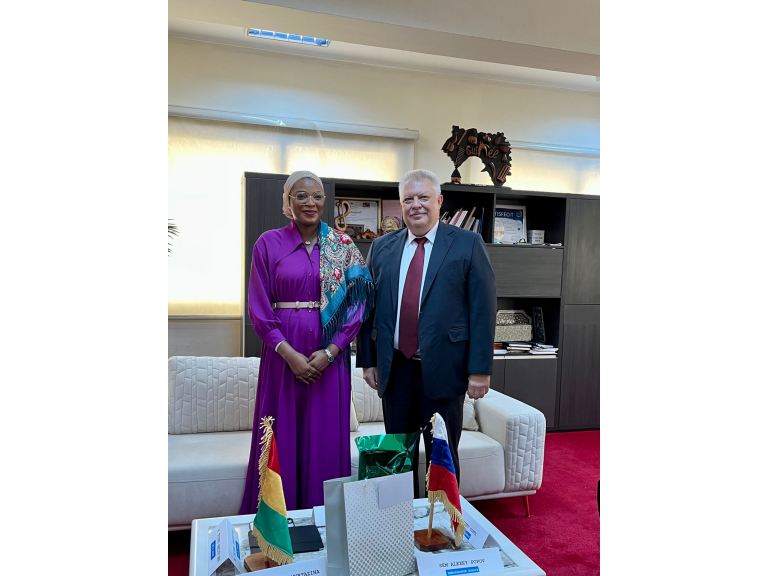03 November / 2023
The courtesy visit to the Minister of Higher Education, Scientific Research and Innovation of Guinea
On November 1, the Russian Ambassador in Conakry H.E.Mr. A.V.POPOV met with the Minister of Higher Education, Scientific Research and Innovation of Guinea H.E.Mme D.SIDIBE.
The Minister thanked Russia for the active assistance in the field of personnel training that has been provided to Guinea since the beginning of its independence.
She noted with satisfaction the expansion of the Russian state scholarship program for Guineans, which has been increased from 65 to 150 people over the past 5 years. According to her, Conakry is interested in further cooperation in this area.
During the conversation, the practice of bilateral scientific exchanges, via Rospotrebnadzor, was emphasized: since 2017, the Russian-Guinean Center for Epidemiology and Prevention of Dangerous Infectious Diseases has been operating in Kindia.
The parties also discussed prospects for the development of cooperation with Guinea's two largest scientific institutes: the Oceanographic Research Center of Conakry-Rogbanè (CERESCOR), created with the participation of Soviet specialists in 1982, and the Research Institute of Applied Biology of Guinea (IRBAG). In particular, CERESCOR, after a many-year “pause,” is now hosting a large group of scientists from the Institute of Biology of the South Seas, (Sevastopol). The purpose of this expedition is to study the anthropogenic impact on the ecosystem of the Fatala River.
The Minister thanked Russia for the active assistance in the field of personnel training that has been provided to Guinea since the beginning of its independence.
She noted with satisfaction the expansion of the Russian state scholarship program for Guineans, which has been increased from 65 to 150 people over the past 5 years. According to her, Conakry is interested in further cooperation in this area.
During the conversation, the practice of bilateral scientific exchanges, via Rospotrebnadzor, was emphasized: since 2017, the Russian-Guinean Center for Epidemiology and Prevention of Dangerous Infectious Diseases has been operating in Kindia.
The parties also discussed prospects for the development of cooperation with Guinea's two largest scientific institutes: the Oceanographic Research Center of Conakry-Rogbanè (CERESCOR), created with the participation of Soviet specialists in 1982, and the Research Institute of Applied Biology of Guinea (IRBAG). In particular, CERESCOR, after a many-year “pause,” is now hosting a large group of scientists from the Institute of Biology of the South Seas, (Sevastopol). The purpose of this expedition is to study the anthropogenic impact on the ecosystem of the Fatala River.

